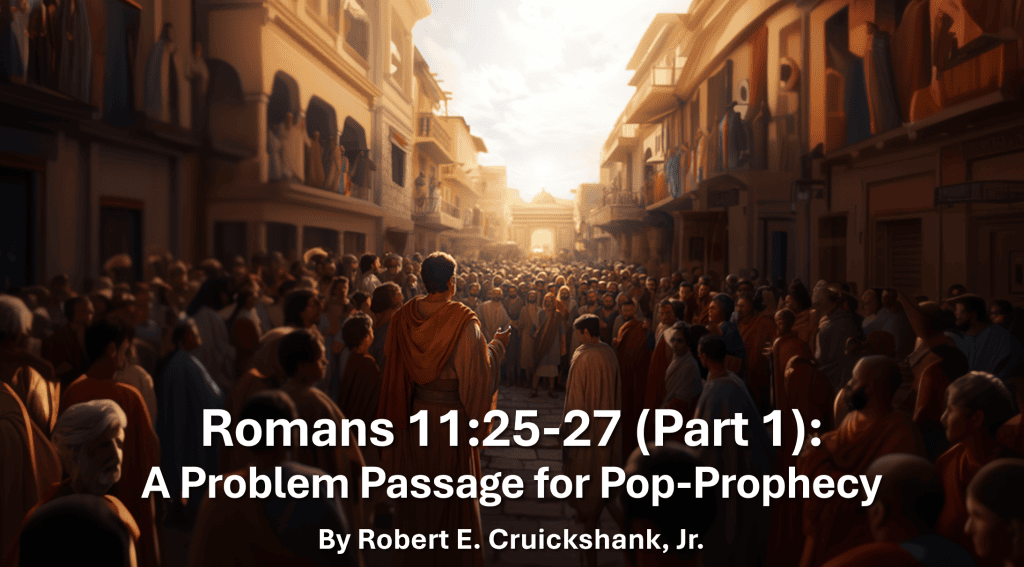Romans 11:25-27 (Part 1): A Problem Passage for Pop-Prophecy
Copyright © Robert E. Cruickshank, Jr. (September 5, 2024)
All Rights Reserved
Eric Ogea and Daniel E. Harden (Editors)
“For I do not want you, brothers and sisters, to be uninformed of this mystery—so that you will not be wise in your own estimation—that a partial hardening has happened to Israel until the fullness of the Gentiles has come in; and so all Israel will be saved; just as it is written: ‘The Deliverer will come from Zion, He will remove ungodliness from Jacob.’ ‘This is My covenant with them,
When I take away their sins” (Romans 11:25-27).
This article begins a series on Romans 11:25-27. In this first installment, we’ll be looking at the popular view of our day and how the prophecy pundits’ construal of this passage puts a cog in the wheel of their apocalyptic machine. In a nutshell, it works in the exact opposite direction of their constant mantra about the rapture being imminent. Yet, they don’t even seem to realize the contradiction or recognize the problem. This being the case, I was very tempted to call the article, “The Fullness of the Gentiles and the Foolishness of Pop-Prophecy.” With that said, let’s look at their interpretation of this prophecy and what it does to their view of Bible prophecy overall.
For the purveyors of pop-prophecy, “The term ‘the fullness of the Gentiles’ refers to the present age in which Gentiles predominate in the church and far exceed Israel in present spiritual blessing.”[1] During this time, the Jewish people remain mostly hardened to the Gospel. According to Andy Woods, this explains why Jews are more reluctant to accept the Gospel than non-Jews. It’s all part of the fulness vs. hardening pattern that we see in Romans 11:25-27. Woods gives us the details:
“And that pattern is what’s happening today. The Jewish people, although many do get saved, as Paul says, have a blindness over their eyes and it’s very difficult to reach out to a Jewish person with the gospel. But the guy down the street that pumps gas for a living and works in the liquor store, the guy with the tattoos all over him, the guy that likes all that music we don’t like, that guy gets saved. The longhaired guy, or the shorthaired guy or the college dropout or the high school dropout, that guy gets saved and here you’re reasoning with all these educated lawyers and doctors and they can’t understand what you’re talking about. That is an explanation of what God is doing in the intercalation where the fullness of the Gentiles is coming in.”[2]
Apparently then, only Jews are “educated lawyers and doctors” while all non-Jews pump gas, work in liquor stores, drop out of high school, get tattoos, and have long hair. Who knew? Woods’s statement also assumes that people who work in gas stations and stores are uneducated. He furthermore implies that educated people “can’t understand” the Gospel message. The entire quotation from Woods is problematic on every level. But the biggest problem is the glitch it creates for his own approach to Bible prophecy.
Wait for It…
As Woods educates us further, something doesn’t add up regarding what those of his ilk have always told us about the imminent Rapture. See if you can spot the problem:
“…the hardening that Israel is under today will not be forever and the Gentiles coming to Christ in droves today will not be forever. One of these days the very last Gentile is going to come in, the body of Christ will be made complete at that point. I would assume that the translation of the church will occur after that number has come in and then God, who is not forgetful of His prior covenants with Israel will fulfill everything He said He would ever do, in and through the nation of Israel.”[3]
By the phrase “the translation of the church,” Woods, of course, means the Rapture. So, according to Woods, the Rapture comes after the fullness of the Gentiles comes in, and there it is – there’s the problem. Even by their own standards, Romans 11:25-27 would mean that there is still something left to be fulfilled before the Rapture happens!
As Woods’ fellow prophecy pundit, Tom Pennington, reminds us, however: “The Rapture of the church occurs before the tribulation, and no signs need to be fulfilled before that happens – it’s imminent, it could happen any day, Christ comes to rapture His church to take them to Himself.”[4]
But isn’t the “fullness of the Gentiles” something that needs to be “fulfilled” before the Rapture happens? How can the Rapture “happen any day” if “the very last Gentile” has not yet come in? How could the Rapture have ever been imminent if this is true, and how can we be sure it’s imminent now?
Houston, We Have a Prophecy Problem
While modern Christians anxiously await their ride into the sky, a noted quotation from another well-known flight seems to fit just right. As Apollo 13 Commander Jack Swigert famously said, “Houston, we have a problem.” Swigert’s words are apropos here. Woods and his crew have a problem when it comes to Romans 11:25-27. A big one.
Despite all the Rapture hype, God’s people can’t even blast off until the Gentiles run down the clock. In reality, modern Christians have been waiting for an imminent event that was never imminent after all. Decade after decade, the Rapture fails to materialize because failure has not been realized. You read that right. Consider the startling words of prophecy pundit Ken Symes:
“‘The fullness of the Gentiles’… speaks of the time when the institutional church will have reached the pinnacle of their failure of not sharing the gospel with Jewish people which will result in God removing the true believing church (the rapture) in preparation for His final judgment of the unbelieving world.”[5]
The idea that the doomsday gurus would be waiting to reach the “pinnacle” of “failure” is ironically fitting in more ways than one. Since the rise of their approach to Bible prophecy in the early to mid-1800s, we’ve successfully failed our culture and our God. Just turn on the news for a daily dose of the fruits of our complacency. But it’s all okay because these are the last days and things are supposed to work out this way, or so they constantly tell us. As John McArthur said back in 2020, “We lose down here.”[6] Again, the Apollo 13 mission is fitting in that the prophecy profiteers really are looking for a “successful failure.”[7]
A Different Mission and a Different Context
With that said, there is a different mission that will help us successfully navigate the words of Romans 11:25-27. And that would be the mission of the man himself who penned those words. Namely, the Apostle Paul. His story begins in the book of Acts, and his mission was no failure. The “fullness of the Gentiles” coming in (Rom. 11:25) anticipates the successful completion of that mission.
With the backdrop of Paul’s missionary efforts illuminating his words in Romans 11, the passage has nothing to do with the much hoped for fast track to heaven (i.e., the Rapture). And it also has nothing do with modern-day Israel being exalted in a future time. Rather, it has everything to do with Paul’s own day and his own time.
The mission of Paul, as it corresponds with Romans 11, will be the focus of our next installment in this series.[8]
_____________________________________________________________________________
[1] Dr. John Walvoord, “The Times of the Gentiles.” Bib Sac Vol 125. Issue 497. Page 9, 1968
[2] https://slbc.org/sermon/ecclesiology-015/
[3] Ibid.
[4] https://countrysidebible.org/sermons/20230924a-181426
[5] https://www.jewishawareness.org/the-fullness-of-the-gentiles/
[6] https://www.youtube.com/watch?v=m_gDxJ8h5A4
[7] https://www.knowitall.org/video/nasas-successful-failure-apollo-13-history-nutshell-shorts#:~:text=Apollo%2013%20is%20remembered%20today,not%20landing%20on%20the%20moon.
[8] As always, many thanks to Jan Logsdon and Brett Prieto for giving their feedback, comments, and suggestions on the early drafts of these articles. A shoutout to Travis Drum for catching the first typo. And special thanks to Zach Davis for prompting me to study this passage more deeply than I had done in the past. See what you started, Zach!


